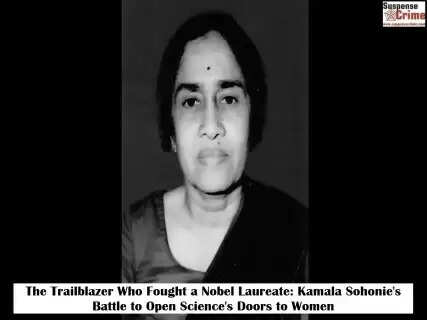
Suspense crime, Digital Desk : In the history of Indian science, few stories of perseverance are as powerful as that of Kamala Sohonie. In an era when science was considered a man's domain, she not only excelled but also fought a battle of wills against a Nobel Prize winner—and won, paving the way for generations of women to follow.The year was 1933. After graduating at the top of her class from Bombay University, Sohonie applied for a research fellowship at the prestigious Indian Institute of Science (IISc) in Bangalore. Her application was flatly rejected by the institute's director, the celebrated Nobel laureate Sir C.V. Raman. His reason was simple and steeped in prejudice: he believed women were not competent enough to pursue research.Unwilling to accept this injustice, Sohonie took a stand. She staged a satyagraha—a form of peaceful protest—outside Raman's office, demanding a fair chance. Her persistence eventually compelled him to relent, but he offered her admission under a set of humiliating conditions:She would be on probation for the first year.Her work would only be recognized after he was fully satisfied.She was not to be a "distraction" to her male colleagues.Sohonie accepted the challenge. She excelled in her research, impressing not only her mentor but eventually C.V. Raman himself. Her exceptional performance shattered his prejudices and forced him to change the institute's policy. The very next year, IISc began formally admitting female students, all because of Sohonie's unwavering spirit.Her journey as a pioneer didn't stop there. Sohonie went on to attend Cambridge University, where, in 1939, she became the first Indian woman to earn a PhD in a scientific discipline.Upon returning to India, she focused her research on nutrition. Her most significant work involved 'Neera,' a popular palm nectar drink. She discovered that Neera was a rich source of vitamins and could be a powerful nutritional supplement for malnourished children and pregnant women in rural India. For this groundbreaking work, she was honored with the Rashtrapati Award.Kamala Sohonie's legacy is not just in her scientific discoveries, but in her courage to challenge the system. She was a trailblazer who broke the glass ceiling of Indian science, proving that competence and brilliance have no gender.
Around the web

